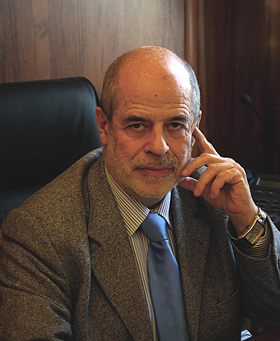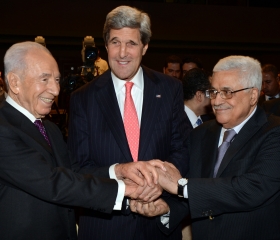Interview
This year may bring a breakthrough in the Middle East conundrum, as the world community is waiting for April 29 that is to show whether the parties to the conflict have space for negotiations. On January 23, 2014 Palestinian President Mahmoud Abbas is coming to Moscow, which might indicate Russia’s growing role in the process. We have met Dr. Vitaly Naumkin, RAS Corresponding Member and Director of RAS Institute of Oriental Studies, to discuss the present and the future of the Middle East peace process, as well possible steps to be taken by Russia.
Interview
This year may bring a breakthrough in the Middle East conundrum, as the world community is waiting for April 29 that is to show whether the parties to the conflict have space for negotiations. On January 23, 2014 Palestinian President Mahmoud Abbas is coming to Moscow, which might indicate Russia’s growing role in the process. We have met Dr. Vitaly Naumkin, RAS Corresponding Member and Director of RAS Institute of Oriental Studies, to discuss the present and the future of the Middle East peace process, as well possible steps to be taken by Russia.
In 1988, the Palestinian National Council proclaimed the establishment of an independent Palestinian State, while in 2012, the UN General Assembly voted to assign it the UN observer status. Moreover, the year before, Palestine became a full member of UNESCO. How would you assess Palestine's current status in view of its sovereign statehood? What seems to be the best way to name this entity – Palestinian Autonomy, Palestinian National Administration, the State of Palestine, or is there a better way?
There is no other variant, since all the three are equally valid. The problem is not in the title but in the fact that far from all countries recognize Palestine as an independent state. The Palestinian Autonomy, which is its official status, definitely possesses all characteristics of a state but it lacks sovereignty over its own territory. What we see is the Israeli occupation of certain lands claimed by Palestine.
Besides, the Gaza Strip and the West Bank are apart, with one territory being governed by Abbas and the other by Hamas, an absolutely different group. The eternal question is about uniting the two forces, i.e. Fatah and Hamas, within the same government and putting the two territories under control of a single authority acceptable for Israel as a negotiating partner.
The characteristics of statehood are at hand, among them – the most important one, i.e. the security of its territory. The Palestinian security forces quite effectively control the West Bank. Today, Hamas is observing ceasefire in the Gaza Strip, preventing violence toward Israel. The greatest threat to Israel comes from the Sinai Peninsula swarming with loose gangs keen on terrorism. I believe it is them rather than Hamas who worry Israel most.
How would you assess the current dynamics of Palestine's relations with neighbor countries? Is there something special in Palestine's relationship with other Arab states?
I would not talk about the particulars of relations with Arab countries due to the fact that the overall situation in the Arab world is utterly unstable.
Let’s take Egypt. Recently it was ruled by a Hamas ally, the Muslim Brotherhood, brought to power by revolution. The movement launched a campaign to rehabilitate Hamas and establish relations with the Gaza Strip, which was later cancelled by the military who reject Hamas as a branch of the Muslim Brotherhood. Such change of policy has complicated the dialogue between Hamas and Egypt that decided to resume collaboration with Abbas. On the other hand, Palestinians would like to benefit from the revived cooperation between Egypt and Israel.
From my perspective, today we are witnessing a brand new aspect of peace building in the Middle East, with Palestinians having switched from the international Quartet to the bilateral U.S.-Palestinian format where Secretary Kerry is extremely energetic. Arab countries are mostly inactive as the two majors, Iraq and Syria, are in a similar plight that prevents them from exercising significant influence on the conflict settlement.
What is your vision of the Israeli-Palestinian conflict evolution? Can Russia play a new role in its peaceful resolution?
Russia can and must play such a role. However, the future implies certain impediments. According to Secretary Kerry's plan, a six-month deadline for Palestine and Israel to develop a final solution is in the offing. In my opinion, such an agreement is unlikely to happen although the Americans insist on the opposite. I don't believe such sensitive issues as refugees, territories, settlements and Jerusalem could be handled that fast.
There is another way, i.e. an intermediate solution through signing an agreement on settled issues and putting aside all the rest problems after the six-month deadline expires. However, that scheme will inevitably discredit the American plan and create subsequent complications for the Palestinians.
If there is no response from Israel, Palestinians will have to appeal to the United Nations once again and carry out their threats of making complaints about Israel to the International Court of Justice. Of course, the lawsuit would aggravate the Palestinian-Israeli relations, but in absence of normal bilateral ties the Palestinian survival will again come into question.
The situation is extremely intricate, with Palestinians counting on President Obama's new policy and a vigorous shuttle diplomacy. I do believe we are witnessing its revival, with Secretary Kerry acting as Henry Kissinger. The Quartet and unfortunately Russia have virtually removed themselves from the peace building process in the Middle East. However, in the coming months, we might expect Russia's comeback because Mahmoud Abbas and the Palestinian leaders would like to see Moscow participating in the resolution of the conflict. The January 23 visit should be regarded as an attempt to revive cooperation with Russia in order to prevent the situation when all eggs are put in the American basket.
Speaking of Mr. Abbas's visit, how would you asses the current level and the future of the Russian-Palestinian relations?
The relations have been traditionally good. Russia is a member of the Middle East Quartet and has been assisting Palestine in certain areas. There is no doubt that Moscow's aid is relatively small in comparison with the huge U.S. and EU packages, but we may boast high-level humanitarian and political cooperation along with economic and security assistance. Nevertheless, despite the evolving dialogue also covers the holy sites and Christian Orthodox ties both with Israel and Palestine, we see the Christian Orthodox population outflow from the West Bank. Such cities as Ramallah, which used to be completely Christian in the past, today only have a few Christian Arabs because most of them have abandoned the area. Russia should take care of the matter and place the issue on the agenda in negotiations with the Palestinian leaders.
Palestinians are well aware that Russia is on very good terms with Israel, on the diasporas level as well, and believe that it may assist in the conflict settlement. However, most Israelis already support the establishment of an independent Palestinian state and a "two state solution." But now it seems unlikely because the Israeli government keeps building new and expanding the existing settlements.
There is no doubt that it is necessary to foster the unification of the West Bank with Gaza and revitalizing the Fatah-Hamas peace talks. Russia could assist in this process as we need a united Palestine. In fact, the Palestinian lack of unity undermines its legitimacy in negotiations and feasibility of building a state in absence of the Gaza Strip.
Do you think Palestine has been affected by the Arab Spring? What was its impact on Palestine’s relations with other states?
Actually, the Arab Spring turbulence seems to be two-fold. Firstly, Palestine is internally unstable, with the unemployed young people being unhappy about the bureaucracy and corruption. But the situation should remain stable thanks to the unifying national-patriotic idea of statehood.
Another effect is the marginalization of the Palestinian issue. While previously it used to be solely a Middle Eastern question, now the focus has shifted to Syria, whose situation is seen as the most serious postwar crisis in the region, and possibly in the world. As a result, the long-lasting Palestinian issue went to the backburner, attracting less attention than Syria, Libya or Iraq.
There will be no normalization of the situation in the Middle East until the Israeli-Palestinian conflict is settled. The resolution of this problem remains the main condition for the regional peace and security.
Dr. Naumkin, we are very thankful for the informative conversation.
Interviewer: Ilya Ivanov, RIAC Program Assistant





